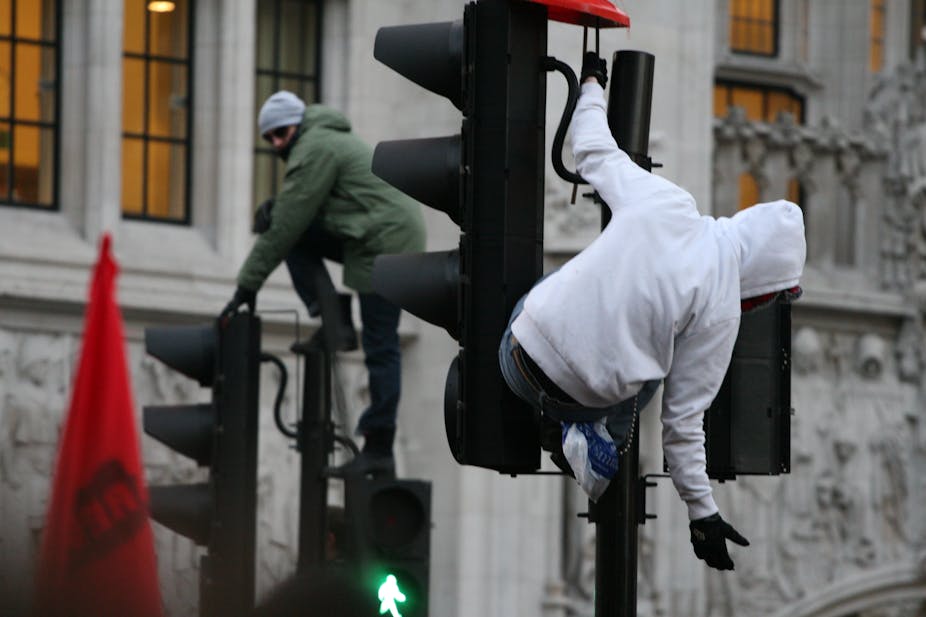A fifth of Britain’s young people are out of work; how long before they snap?
The International Labour Organisation has recently issued warnings about possible youth unrest in the future, as young people bear the brunt of unemployment in a global recession.
A brief examination of the trajectory of riots, unrest and protest in Europe over the past two centuries reveals a discernible and very important trend. In a recent study of participants in the English riots of August 2011, James Treadwell, Daniel Briggs, Simon Winlow and I argued that the rapid metamorphosis from an initial protest against a perceived injustice to “aggravated shopping” was historically unique in England.
The way the riots developed indicated the existence of a depoliticised section of the youth population. These young people are fully incorporated into consumer culture and lack any means of articulating their dissatisfaction or of making political demands for a better future.
This is a significant departure from the past. Riots in 18th century England tended to focus on specific issues such as food prices or religious rights. After the 1880s they became heavily infused with the universal political symbolism of socialism, communism or social democracy, leading into the 1926 General Strike and organised protest between the World Wars.
After World War II, a complex industrial relations system evolved and social conflict became directed through institutions like trade unions. Political unrest diminished and riots were largely associated with ethnic tensions. As militant socialist politics remained influential, the strike and the demonstration were the principal forms of protest. Politics took place in a non-violent way within the system.
During the deindustrialisation process of the 1980s and 1990s, chronic unemployment, combined with ethnic tensions and single issues such as the proposed Poll Tax, set a context for more frequent and violent riots.
During this period the working class’ positive political vision and universal symbolism seemed to evaporate. In the riots of 2011 neither could be detected; consumer culture had almost entirely displaced class and politics as the principal source of young people’s identity.
We must now ask how underemployed and depoliticised sections of youth, not simply youth in general, might react to the effects of the global economic slowdown in today’s consumer-orientated Britain.
In continental Europe, where vestiges of traditional politics hold greater sway, it is still possible to see protests in which specific demands are made on the state. In the UK, apart from a small few attracted to the far right, young people at the bottom of the socioeconomic hierarchy show extreme disaffection towards all forms of politics.
The expectation that social movements would proliferate to put pressure on the system seems to have been a false dawn. The recent Occupy movement represent negative politics; they are “against capitalism” but offer no positive and comprehensible political vision to inspire mass support.
European countries with mass youth unemployment such as Greece and Spain are characterised by a combination of negative politics and worrying signs of a potential drift to the far right.
However, in the UK, the future of riots and protest is uncertain. In the absence of universal political symbolism, the majority of the population seems to be atomised, lethargic and incorporated into the values of consumer culture.
Austerity cuts are increasing the anxiety and resentment of many amongst the unemployed and underemployed, but the surveillance state backed up by an expanding private security industry seems, for the moment, to be keeping a lid on things.
In the near future the likely scenario is one of small negative political protests staged by an articulate middle class in response to disruptive macro-events such as financial crises, interspersed by the occasional anti-fascist protest and sporadic eruptions of potentially violent unrest triggered by micro-events such as instances of police brutality.
Only the re-emergence of articulate and inspiring universal symbolism will revive the positive political protest and truly restart history. But at the moment, in a culture dominated by the distractions of consumerism, it’s difficult to see where this might come from.
In the UK, even when unrest does occur, our one-in-five are likely to remain more interested in smashing shops than smashing the system.

